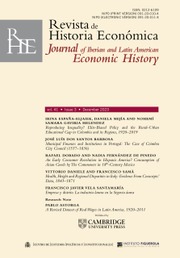Article contents
«To Have and to Have not». The Economic Consequences of Empire: Portugal (1415–1822)
Published online by Cambridge University Press: 28 April 2010
Extract
The assessment of the economic consequences of empires from the fifteenth century to the present raises a set of problems which should not be concealed, if we are to provide any meaningful answers to the questions implied in such a survey. First, it is useful to remember that these questions, as so many addressed by social scientists, are immersed in the interminable ideological debate about the development of nations. For example, it is not easy to avoid the judgement of empires as inherendy good or bad, and to evade the prevailing notion that they are evil structures resting on some kind of violence, on which consequently it is not decent for any nation to have built its wealth. Anyway, even if we could easily do away with ideological controversies, and we cannot, we would still lack the appropriate statistical data, at least for most of the period under examination, which could support an accurate evaluation of the true economic consequences of empire. In fact, since we may never construct a plausible cost-benefit matrix or an acceptable estimate of the relative significance of imperial ventures1, controversy will always continue, not only about the interpretation of the effects of imperialism, but about the facts and figures themselves.
- Type
- Articles-Artículos: Part 2. European Economics in the First Epoch of Imperialism and Mercantilism, 1415–1846
- Information
- Revista de Historia Economica - Journal of Iberian and Latin American Economic History , Volume 16 , Issue 1: The costs and benefits of european imperialism from the conquest of Ceuta, 1415, to the treaty of Lusaka, 1974. Twelfth International Economic History Congress. Madrid 1998 , March 1998 , pp. 93 - 122
- Copyright
- Copyright © Instituto Figuerola de Historia y Ciencias Sociales, Universidad Carlos III de Madrid 1998
References
REFERENCES
- 3
- Cited by




